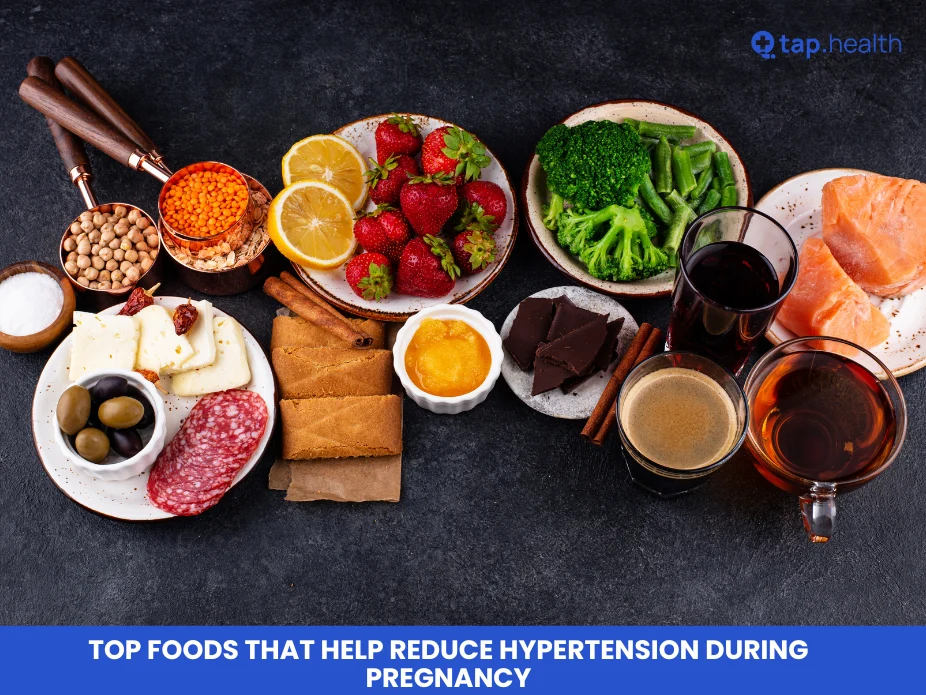Hypertension in pregnancy, also known as gestational hypertension, affects 6-8% of pregnant women and increases the risk of preeclampsia, preterm birth, and low birth weight. While medical supervision is essential, a targeted, nutrient-dense diet rich in potassium, magnesium, omega-3s, and natural nitrates is proven to help lower blood pressure safely during pregnancy.
Here are the top 10 evidence-based foods that reduce hypertension in pregnancy, along with practical ways to add them daily.
1. Leafy Greens – Best Source of Potassium for Blood Pressure Control
Spinach, kale, collard greens, and Swiss chard are loaded with potassium and magnesium. Potassium counters sodium and relaxes blood vessels. One cup of cooked spinach delivers over 800 mg of potassium.
How to add: Green smoothies, sautéed side dishes, or salad base.
2. Berries – Anthocyanin-Rich Superfoods for Vascular Health
Blueberries, strawberries, and raspberries lower systolic blood pressure by improving endothelial function (2023 meta-analysis, American Journal of Clinical Nutrition).
How to add: Fresh snack, yogurt topping, or overnight oats mix.
3. Bananas – Quick Potassium Boost Without Extra Calories
One medium banana provides ~422 mg potassium and soluble fiber that supports healthy blood pressure and prevents pregnancy constipation.
How to add: On-the-go snack or blended in smoothies.
4. Beets & Beetroot Juice – Natural Nitrate Powerhouse
Dietary nitrates in beets convert to nitric oxide, dilating blood vessels and dropping blood pressure by 4–10 mmHg in studies.
How to add: Roasted beets in salads or 200 ml fresh beet juice 2–3 times weekly.
5. Oats – Soluble Fiber and Magnesium for Heart Health
Beta-glucan in oats reduces LDL cholesterol and blood pressure. Oats are also one of the highest magnesium sources among grains.
How to add: Breakfast oatmeal, lactation cookies, or added to smoothies.
6. Garlic – Allicin for Blood Vessel Relaxation
Fresh garlic and aged garlic extract consistently show modest blood pressure reduction and are safe throughout pregnancy.
How to add: Crush and let sit 10 minutes before cooking to maximize allicin.
7. Salmon & Other Fatty Fish – Omega-3 DHA/EPA Gold Standard
Omega-3 fatty acids reduce inflammation and lower both systolic and diastolic pressure. Salmon is low-mercury and pregnancy-safe (2–3 servings/week recommended by ACOG).
How to add: Baked, grilled, or in patties.
8. Avocados – Monounsaturated Fats + Potassium Combo
Half an avocado gives 485 mg potassium plus heart-healthy fats that improve arterial flexibility.
How to add: Toast, salads, or guacamole.
9. Nuts & Seeds (Almonds, Walnuts, Chia, Flax) – Magnesium and Plant Omega-3
Walnuts and flaxseeds provide ALA (plant omega-3), while almonds and pumpkin seeds are magnesium-rich. A handful daily supports blood pressure control.
How to add: Trail mix, sprinkled on yogurt, or ground into smoothies.
10. Citrus Fruits – Vitamin C and Hesperidin for Strong Vessels
Oranges, grapefruit, and lemons supply potassium and hesperidin, a flavonoid that improves blood vessel elasticity.
How to add: Whole fruit, fresh juice (no added sugar), or segments in salads.
Real-Life Impact of These Foods
Sarah, 32 weeks pregnant with gestational hypertension, added daily spinach-banana-berry smoothies, two salmon meals with salmon weekly, and roasted beets. Within three weeks her blood pressure dropped from 145/92 to 128/82, avoiding medication.
Expert-Backed Tips to Lower Blood Pressure in Pregnancy
- Aim for 4,700 mg potassium daily (current recommendation for pregnant women)
- Limit sodium to <2,300 mg/day; avoid processed foods
- Include at least 200–300 mg DHA/EPA from food or supplements (after doctor approval)
- Stay hydrated – water helps kidneys excrete excess sodium
- Monitor blood pressure at home and share readings with your OB-GYN
Frequently Asked Questions About Foods and Hypertension in Pregnancy
Q: Which food lowers blood pressure the fastest during pregnancy?
A: Beetroot juice and leafy greens show the quickest effect (within hours to days) due to nitrates and potassium.
Q: Can I eat salt at all if I have gestational hypertension?
A: Moderate natural salt is fine; the problem is hidden sodium in processed foods. Focus on whole foods.
Q: Are supplements like potassium or magnesium safe instead of food?
A: Always prefer food sources. Supplements require medical supervision to avoid imbalance.
Q: How much salmon is safe per week when pregnant?
A: 2–3 servings (8–12 oz) cooked servings of low-mercury fish like salmon are recommended by FDA and ACOG.
Can TapHealth Help Manage Both Hypertension and Gestational Diabetes Together?
Yes! The TapHealth app lets you track blood pressure, blood sugar, food intake, weight, and symptoms in one place – perfect for women managing both gestational hypertension and gestational diabetes simultaneously. Get personalized insights and share reports instantly with your doctor.
Start incorporating these hypertension-lowering foods today for a healthier, safer pregnancy tomorrow! Always consult your healthcare provider before making major dietary changes.
For more information on pregnancy nutrition, visit the American Pregnancy Association.



